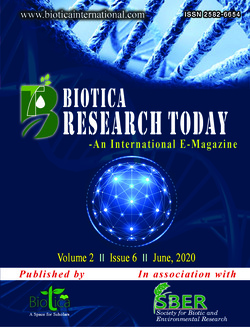
Nanotechnology: Advanced Technique in Postharvest Management of Horticultural Crops
Khyati Singh
Department of Vegetable Science, CCS Haryana Agricultural University, Hisar, Haryana (125004), India
DOI: NIL
Keywords: Nanotechnology, Nanobiosensors, Photocatalysis, Labelling
Abstract
The post-harvest loss estimates are one-third of food products every year and is one of the important issues in storage of fruits and vegetables. These losses depend upon many factors like type of crop, method of crop harvesting, distance from field to storage, etc. Fruits and vegetables are perishable in nature and their chances to spoil are more. The major reasons for post-harvest losses are microbial attack, moisture, degradation, physical and chemical contamination, etc. Nanotechnology has arrived as great help in all science and industry branches. Nanoparticles having particular characteristics are useful in postharvest technologies. It can improve the post-harvest shelf life by controlling the growth, development and spread of disease causing microorganisms. With the development of new generation of packaging coverage’s (Films), increasing strength, quality and packaging beauty and using the nanobiosensors for labelling the food products has proved beneficial for controlling postharvest losses.
Downloads
not found
Reference
Hu, A.W., Fu, Z.H., 2003. Nano technology and its application in packaging and packaging machinery, Packag. Eng. 24, 22-24.
Liu, J., Tian, S.P., Meng, X.H., Xu, Y. 2007. Effects of chitosan on control of postharvest diseases and physiological responses of tomato fruit. Postharvest Biol. Technol. 44, 300-306.
Sinha Ray, S., Okamoto, M., 2003. Polymer/layered silicate nanocomposites: a review from preparation to processing. Progress Polym. Sci. 28, 1539-1641.
